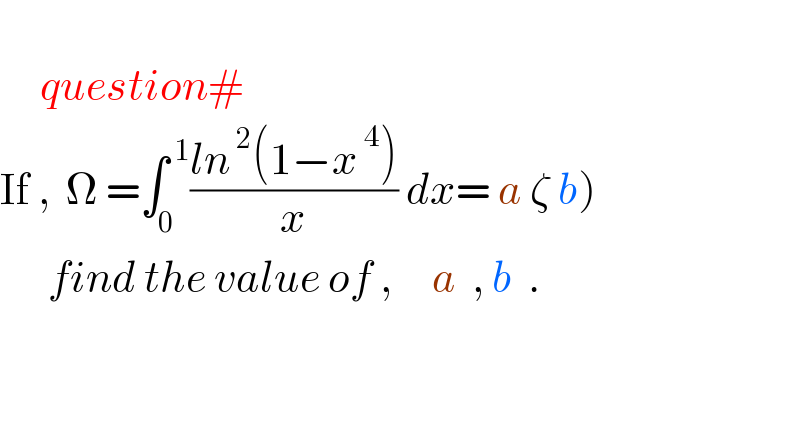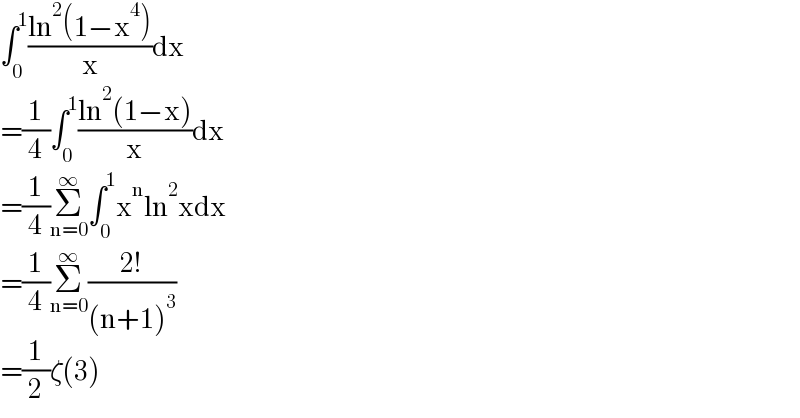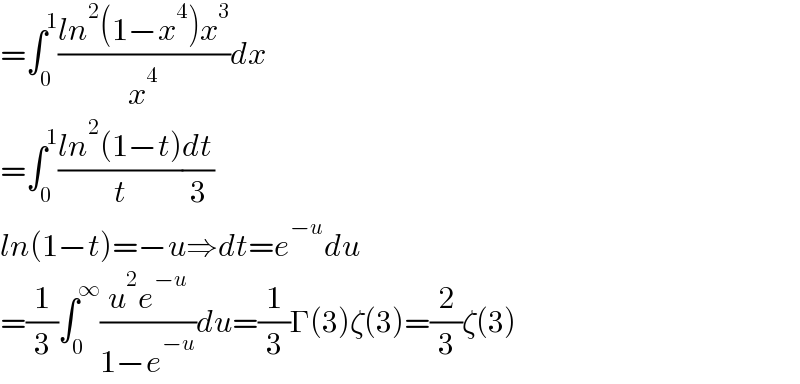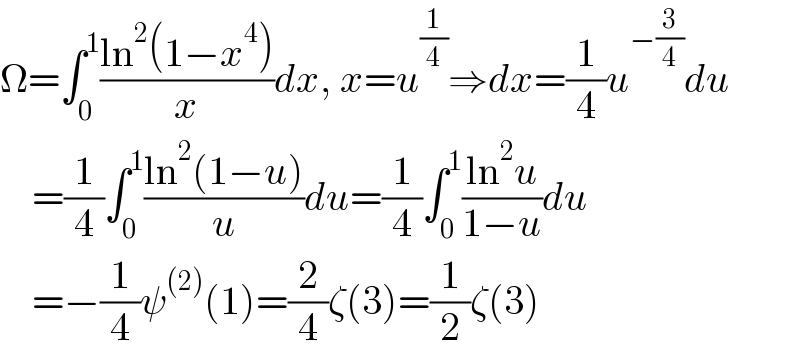
Question Number 158293 by mnjuly1970 last updated on 02/Nov/21

$$ \\ $$$$\:\:\:\:\:{question}# \\ $$$$\left.\mathrm{If}\:,\:\:\Omega\:=\int_{\mathrm{0}} ^{\:\mathrm{1}} \frac{{ln}^{\:\mathrm{2}} \left(\mathrm{1}−{x}^{\:\mathrm{4}} \right)}{{x}}\:{dx}=\:{a}\:\zeta\:{b}\right) \\ $$$$\:\:\:\:\:\:{find}\:{the}\:{value}\:{of}\:,\:\:\:\:\:{a}\:\:,\:{b}\:\:. \\ $$$$ \\ $$$$ \\ $$
Answered by qaz last updated on 02/Nov/21

$$\int_{\mathrm{0}} ^{\mathrm{1}} \frac{\mathrm{ln}^{\mathrm{2}} \left(\mathrm{1}−\mathrm{x}^{\mathrm{4}} \right)}{\mathrm{x}}\mathrm{dx} \\ $$$$=\frac{\mathrm{1}}{\mathrm{4}}\int_{\mathrm{0}} ^{\mathrm{1}} \frac{\mathrm{ln}^{\mathrm{2}} \left(\mathrm{1}−\mathrm{x}\right)}{\mathrm{x}}\mathrm{dx} \\ $$$$=\frac{\mathrm{1}}{\mathrm{4}}\underset{\mathrm{n}=\mathrm{0}} {\overset{\infty} {\sum}}\int_{\mathrm{0}} ^{\mathrm{1}} \mathrm{x}^{\mathrm{n}} \mathrm{ln}^{\mathrm{2}} \mathrm{xdx} \\ $$$$=\frac{\mathrm{1}}{\mathrm{4}}\underset{\mathrm{n}=\mathrm{0}} {\overset{\infty} {\sum}}\frac{\mathrm{2}!}{\left(\mathrm{n}+\mathrm{1}\right)^{\mathrm{3}} } \\ $$$$=\frac{\mathrm{1}}{\mathrm{2}}\zeta\left(\mathrm{3}\right) \\ $$
Commented by mnjuly1970 last updated on 02/Nov/21

$${grateful}\:{sir}\:{qaz} \\ $$$${excellent}\:{as}\:{always} \\ $$
Answered by mindispower last updated on 02/Nov/21

$$=\int_{\mathrm{0}} ^{\mathrm{1}} \frac{{ln}^{\mathrm{2}} \left(\mathrm{1}−{x}^{\mathrm{4}} \right){x}^{\mathrm{3}} }{{x}^{\mathrm{4}} }{dx} \\ $$$$=\int_{\mathrm{0}} ^{\mathrm{1}} \frac{{ln}^{\mathrm{2}} \left(\mathrm{1}−{t}\right)}{{t}}\frac{{dt}}{\mathrm{3}} \\ $$$${ln}\left(\mathrm{1}−{t}\right)=−{u}\Rightarrow{dt}={e}^{−{u}} {du} \\ $$$$=\frac{\mathrm{1}}{\mathrm{3}}\int_{\mathrm{0}} ^{\infty} \frac{{u}^{\mathrm{2}} {e}^{−{u}} }{\mathrm{1}−{e}^{−{u}} }{du}=\frac{\mathrm{1}}{\mathrm{3}}\Gamma\left(\mathrm{3}\right)\zeta\left(\mathrm{3}\right)=\frac{\mathrm{2}}{\mathrm{3}}\zeta\left(\mathrm{3}\right) \\ $$
Commented by mnjuly1970 last updated on 03/Nov/21

$${thx}\:{sir}\:{power} \\ $$
Answered by Ar Brandon last updated on 02/Nov/21

$$\Omega=\int_{\mathrm{0}} ^{\mathrm{1}} \frac{\mathrm{ln}^{\mathrm{2}} \left(\mathrm{1}−{x}^{\mathrm{4}} \right)}{{x}}{dx},\:{x}={u}^{\frac{\mathrm{1}}{\mathrm{4}}} \Rightarrow{dx}=\frac{\mathrm{1}}{\mathrm{4}}{u}^{−\frac{\mathrm{3}}{\mathrm{4}}} {du} \\ $$$$\:\:\:\:=\frac{\mathrm{1}}{\mathrm{4}}\int_{\mathrm{0}} ^{\mathrm{1}} \frac{\mathrm{ln}^{\mathrm{2}} \left(\mathrm{1}−{u}\right)}{{u}}{du}=\frac{\mathrm{1}}{\mathrm{4}}\int_{\mathrm{0}} ^{\mathrm{1}} \frac{\mathrm{ln}^{\mathrm{2}} {u}}{\mathrm{1}−{u}}{du} \\ $$$$\:\:\:\:=−\frac{\mathrm{1}}{\mathrm{4}}\psi^{\left(\mathrm{2}\right)} \left(\mathrm{1}\right)=\frac{\mathrm{2}}{\mathrm{4}}\zeta\left(\mathrm{3}\right)=\frac{\mathrm{1}}{\mathrm{2}}\zeta\left(\mathrm{3}\right) \\ $$
Commented by mnjuly1970 last updated on 03/Nov/21

$${mercey}\:{mr}\:{brandon} \\ $$
